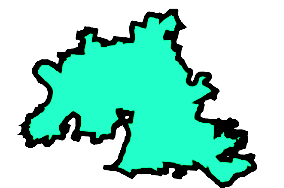GeoSeries attributes and methods I
Visualizing Geospatial Data in Python

Mary van Valkenburg
Data Science Program Manager, Nashville Software School
Shapely attributes and methods
# the geometry column is a GeoSeries
type(school_districts.geometry)
geopandas.geoseries.GeoSeries
GeoSeries.area- returns the area of each geometry in a GeoSeriesGeoSeries.centroid- returns the center point of each geometry in a GeoSeriesGeoSeries.distance(other)- returns the minimum distance toother
GeoSeries.area
- returns the area of each geometry in a GeoSeries
# area of first polygon in districts
print(districts.geometry[0].area)
325.78

School district areas
GeoSeries.area
# print first 4 rows of school districts and the total number of rows
print(school_districts.head(4))
print('There are ', school_districts.shape[0], ' school districts.' )
first_name last_name position district geometry
Sharon Gentry Member 1 (POLYGON ((-86.771 36.383...)))
Jill Speering Vice-Chair 3 (POLYGON ((-86.753 36.404...)))
Jo Ann Brannon Member 2 (POLYGON ((-86.766 36.083...)))
Anna Shepherd Chair 4 (POLYGON ((-86.580 36.209...)))
There are 9 school districts.
# calculate area of each school district
district_area = school_districts.area
# print the areas and crs used
print(district_area.sort_values(ascending = False))
print(school_districts.crs)
0 0.036641
4 0.023030
8 0.015004
1 0.014205
3 0.014123
5 0.010704
2 0.008328
7 0.007813
6 0.006415
dtype: float64
epsg:4326
# create a copy of school_districts that uses EPSG:3857 school_districts_3857 = school_districts.to_crs(epsg = 3857)# define a variable for m^2 to km^2 and get area in kilometers squared sqm_to_sqkm = 10**6 district_area_km = school_districts_3857.area / sqkm_to_sqm print(district_area_km.sort_values(ascending = False)) print(school_districts_3857.crs)
0 563.134380
4 353.232132
8 230.135653
1 218.369949
3 216.871511
5 164.137548
2 127.615396
7 119.742279
6 98.469632
dtype: float64
epsg:3857
Let's Practice!
Visualizing Geospatial Data in Python

